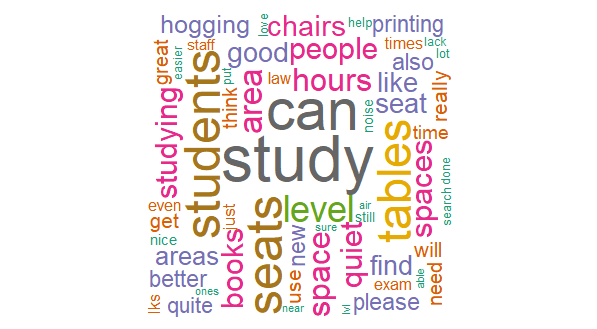Difference between revisions of "IS428 AY2019-20T2 Assign LIM PAO LING RACHEL Wordcloud"
| Line 39: | Line 39: | ||
A word cloud was used to determine the frequency of words used within the comments by the respondents. The larger the word size, the higher the frequency of the word appearing in the comments. | A word cloud was used to determine the frequency of words used within the comments by the respondents. The larger the word size, the higher the frequency of the word appearing in the comments. | ||
| + | With the help of R programming, unwanted part of the comments such as punctuation, stop words and unnecessary symbols, were removed in order to focus solely on the important words that could give insights on comments about SMU libraries. | ||
| − | |||
Based on the word cloud, key words such as study, students, hogging, space, quiet, tables, seats, printing and hours appear more frequently. It could imply that most of the comments are generally discussing about the facilities and equipment management of SMU libraries. Therefore, SMU libraries should focus future surveys that question more about how to improve facilities provided and questions to pinpoint the equipment that library goers might look out for. | Based on the word cloud, key words such as study, students, hogging, space, quiet, tables, seats, printing and hours appear more frequently. It could imply that most of the comments are generally discussing about the facilities and equipment management of SMU libraries. Therefore, SMU libraries should focus future surveys that question more about how to improve facilities provided and questions to pinpoint the equipment that library goers might look out for. | ||
|} | |} | ||
Latest revision as of 23:29, 15 March 2020
SMU Library Dashboards
Link to Visualisation ⇨ https://public.tableau.com/profile/rachel.lim#!/vizhome/Assignment_SMULibrarySurvey2018_Visualisation/OverallStatisticsDashboard
| Observations & Insights |
|---|
|
Comment Wordcloud A word cloud was used to determine the frequency of words used within the comments by the respondents. The larger the word size, the higher the frequency of the word appearing in the comments. With the help of R programming, unwanted part of the comments such as punctuation, stop words and unnecessary symbols, were removed in order to focus solely on the important words that could give insights on comments about SMU libraries. Based on the word cloud, key words such as study, students, hogging, space, quiet, tables, seats, printing and hours appear more frequently. It could imply that most of the comments are generally discussing about the facilities and equipment management of SMU libraries. Therefore, SMU libraries should focus future surveys that question more about how to improve facilities provided and questions to pinpoint the equipment that library goers might look out for. |
